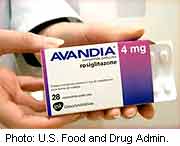
WEDNESDAY, July 14 (HealthDay News) — The controversial diabetes drug Avandia does raise the risk of heart attack more than other medications of its kind but should stay on the market with tightened controls, a U.S. government advisory panel recommended late Wednesday.
By a complex series of votes, the 33-member panel of experts rejected the option that the U.S. Food and Drug Administration remove Avandia from the market for safety reasons.
The series of votes started, according to the New York Times, with 18 members of the panel voting that Avandia might up the risk of heart attack, six saying they weren’t concerned about a raised risk, and nine saying they were unsure.
On their second vote, however, only one member of the committee thought that Avandia increases the risk of death when compared with older medicines, 20 said it did not increase the risk of death, and 12 remained unsure.
The panel seemed more decided when comparing Avandia’s safety risks to its sister medication, Actos. Twenty panel members voted that Avandia was more likely to cause heart attack than Actos, four voted that it was no more likely to do so, and eight said they didn’t know, the Associated Press reported.
And on the key vote, the decision on Avandia’s future, 12 members voted for pulling the drug, 17 voted for new warning label revisions or restrictions on use, and three voted that no changes were needed.
“I don’t think there’s any question that the use of the drug will decrease and that both physicians and patients will look at the warning very carefully before prescribing Avandia, although that assumes that the final FDA ruling will follow the panel’s recommendation,” said Dr. Alan Kadish, president and CEO of Touro College, after the votes.
The outcome, he added, was not a surprise. “I expected the vote to be split, and it was split in even more complex ways than one might have imagined. The panel did the best they could with data that weren’t completely conclusive, that suggested an increased risk but didn’t make it clear how much that increased risk was,” he said.
And he explained, “The majority of the panel didn’t feel the increased risk was enough to summarily remove a drug that hundreds of thousands of people are taking successfully.”
A second heart expert agreed.
“I didn’t think that the evidence was yet compelling enough to withdraw the product from the market,” said Dr. Kirk Garratt, clinical director of interventional cardiovascular research at Lenox Hill Hospital in New York City. “It sounds like they’re going to add some new warnings regarding the risk, and that seems like an appropriate step.”
And such a step will likely decrease the use of Avandia, anyway, Garratt added. “Use went down pretty sharply after criticism started to fly and the presence of new boxed warnings will further depress the prevalence of this product in the marketplace,” he said.
But Garratt also said he didn’t think the experts’ votes would end the controversy over Avandia.
“There is so much dissent within the FDA about the appropriate action to take with this drug that I can’t imagine this will be the final world,” he said. “Also, we’ve got an alternative product [Actos] that seems to be essentially as effective at controlling diabetes but hasn’t been linked to the cardiovascular risks.”
In a statement released after the vote, Dr. Ellen Strahlman, chief medical officer at GlaxoSmithKline, which makes Avandia, said, “Following today’s recommendations, we will, of course, continue to work with the FDA in the best interest of diabetes patients … Patients taking Avandia should speak with their physician about their treatment and any questions they may have regarding the safety of the medicine.”
The FDA committee had been meeting intensively since early Tuesday morning, hearing differing opinions not only from outside experts and pharmaceutical representatives but also from within the FDA itself.
The safety of the blood-sugar-lowering drug, part of the thiazolidinedione family, has been in question for years.
In 2005, the FDA asked Glaxo to conduct a meta-analysis of all its clinical trials on the drug.
The analysis, which did show a signal of increased risk of heart attack, was submitted to the FDA the following year.
FDA then did its own analysis while a number of other trials came out also showing signals of heart troubles.
In November of 2007, FDA added a boxed warning to the drug saying that there was a potential risk of increased cardiovascular ischemic events with Avandia.
The expert panel focused much of its attention on the results of the highly publicized RECORD (Rosiglitazone Evaluated for Cardiac Outcomes and Regulation of Glycemia in Diabetes), announced in June of 2009. The trial found that Avandia significantly raises the risk of heart failure (and bone fractures) though not cardiovascular disease or death.
Both Avandia and Actos, which is made by Takeda, came with warnings regarding heart failure when they were first approved.
The drama intensified considerably just before the advisory meeting began. Last Friday, an FDA official posted statements on the agency’s web site questioning the design and interpretation of the pivotal RECORD trial.
Then in a report released early Tuesday, the Times said that GSK knew more than a decade ago that Avandia caused an increased risk of heart problems but covered up the information.
Glaxo, in a prepared statement, said that, “The RECORD study was conducted according to good clinical practices and the data are reliable. . . RECORD demonstrated that Avandia was not associated with an overall increase in cardiovascular hospitalization or cardiovascular death compared to [diabetes drugs] metformin and sulfonylureas.”
The FDA is not obligated to follow the recommendations of its expert panels, but it usually does.
More information
There’s more on the thiazolidinedione class of diabetes drugs at the U.S. National Library of Medicine.

